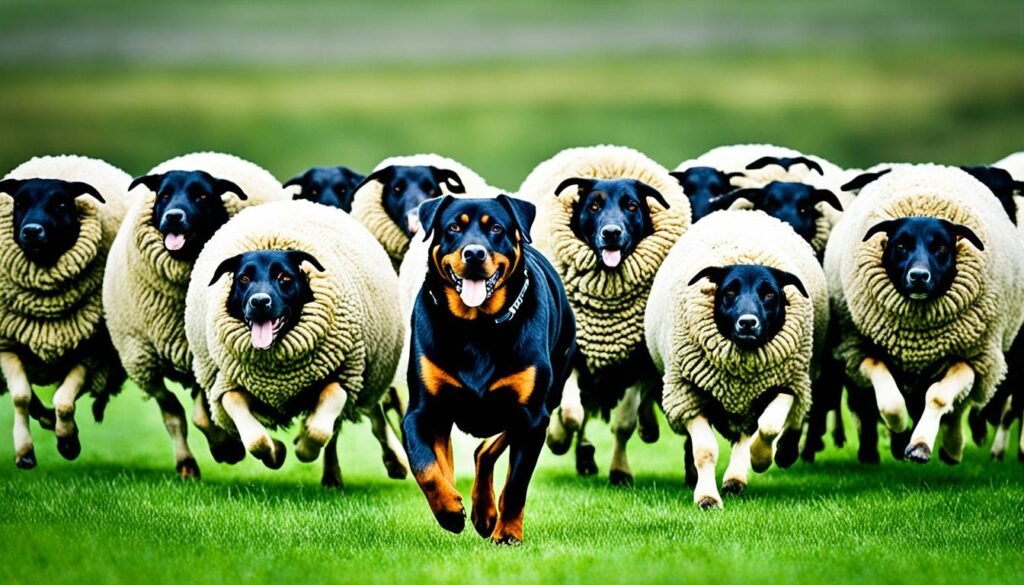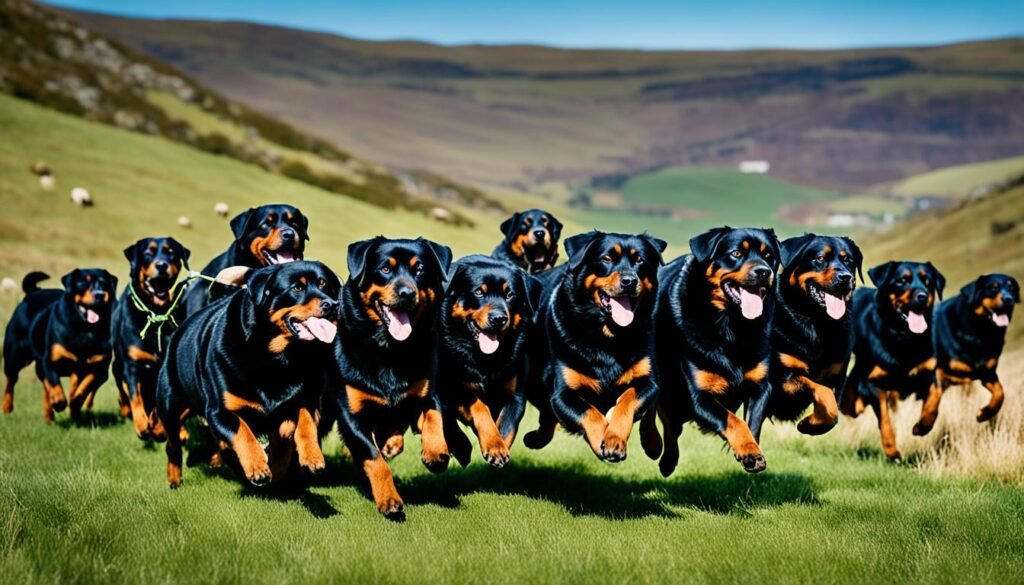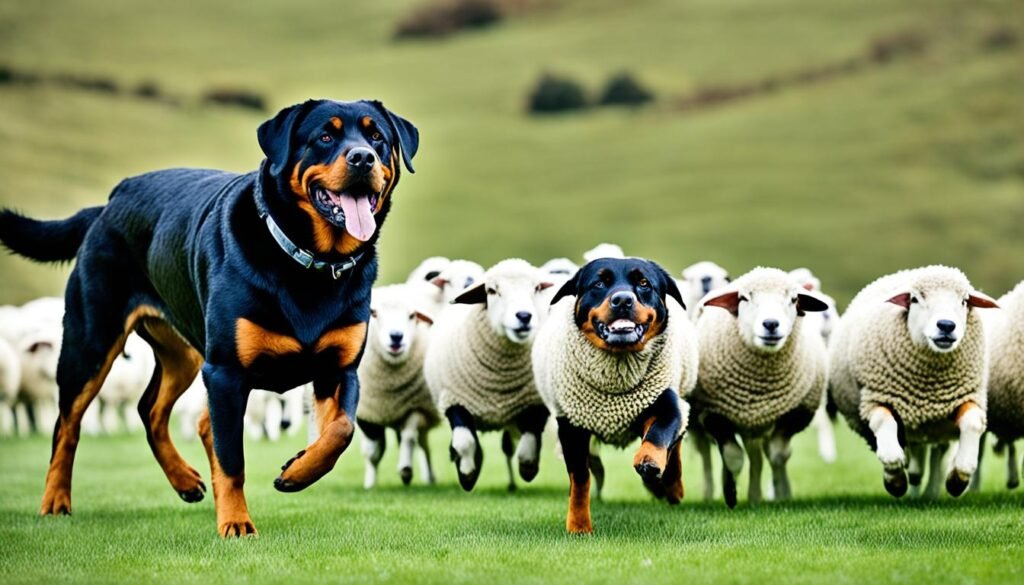Greetings! Today, I’m excited to explore the fascinating topic of Rottweilers as herding dogs. Rottweilers, often affectionately called Rotties, are well-known for their powerful presence, unwavering loyalty, and protective nature. But did you know that they also possess remarkable herding instincts and capabilities?
As we delve deeper into the world of Rottweilers, we discover that their herding abilities are deeply rooted in their breed’s history. Descendants of ancient Roman herding dogs, Rottweilers once served as trusted “drovers,” safeguarding and guiding livestock. In addition to their herding responsibilities, they even protected valuable resources such as money, earning them the nickname “butcher’s dog.”
Fast forward to the present, and Rottweilers can be seen participating in herding events alongside esteemed sheepdogs and shepherds. Their intelligence and eagerness to please make them versatile learners, excelling in various roles such as service dogs, therapy dogs, and obedient companions.
However, it’s essential to highlight that proper training and socialization are key to bringing out the best in a Rottweiler’s temperament. With the right guidance and care, Rottweilers can exhibit a gentle and affectionate nature with their families, while still retaining their natural protective instincts.
Key Takeaways:
- Rottweilers possess herding instincts and capabilities.
- They descended from ancient Roman herding dogs and were known as “drovers.”
- They can excel in herding events alongside other herding breeds.
- Proper training and socialization are essential for their temperament.
- Rottweilers are intelligent, eager to please, and make exceptional companions.
The History and Origin of Rottweilers as Herding Dogs
Rottweilers have a rich history as herding dogs that can be traced back to ancient Rome. While there is no documented proof, it is widely believed that Rottweilers descended from the herding dogs of ancient Rome. These dogs were used to perform various jobs, including protecting and herding livestock.
As the Roman empire expanded, Rottweilers were utilized to transport and guard the cattle that provided food for the army. They were also responsible for protecting the cattlemen’s money during travel, earning them the nickname “butcher’s dog.”
Over the centuries, Rottweilers continued to be valued for their herding abilities and served as indispensable working dogs. Their journey from ancient Rome to contemporary homes highlights their enduring adaptability and versatility.
The Temperament and Personality of Rottweilers as Herding Dogs

Rottweilers are well-known for their loyalty, confidence, and protective nature, which make them excellent candidates for herding activities. Despite their imposing appearance and natural guarding instinct, Rottweilers can display a gentle and affectionate nature when properly trained and socialized. This breed ranks among the top ten intelligent dog breeds and possesses a remarkable eagerness to learn and please their owners. Their intelligence, combined with their problem-solving skills, makes them exceptional learners.
While Rottweilers tend to be reserved with strangers, they can form strong bonds with their families and get along well with other animals and people given the appropriate training and socialization. It is important to note that a Rottweiler’s behavior is heavily influenced by its upbringing and treatment, emphasizing the significance of responsible ownership. With proper care and guidance, Rottweilers can be gentle, loving, and effective working dogs, showcasing their true herding temperament and personality.
As herding dogs, Rottweilers offer a unique blend of protective instincts and intelligence, making them well-suited for various tasks. Their temperament and personality traits play a vital role in their success as herding dogs, allowing them to excel in their duties and forge deep connections with their handlers. By understanding and nurturing their herding instincts, Rottweilers can thrive in herding activities and serve as valuable members of their working teams.
Training and Socialization for Rottweilers as Herding Dogs

Training and socialization are crucial aspects of developing a Rottweiler’s behavior and herding capabilities. To ensure a well-rounded and obedient herding dog, it is essential to start early and be consistent in their training.
The Importance of Socialization
Early socialization is key to raising a confident and well-adjusted Rottweiler. It is recommended to begin socializing them between 3 to 14 weeks of age, during their sensitive period. This involves exposing them to various environments, people, and animals in a positive manner. By doing so, we can prevent the development of fear, anxiety, and aggression towards unfamiliar situations and beings.
Consistent Training with Clear Guidelines
Rottweilers thrive on clear and consistent guidelines. They respond well to positive reinforcement training, where desired behaviors are rewarded with treats, praise, or play. This method not only strengthens their bond with their handlers but also motivates them to repeat the desired behaviors. Consistency in training helps establish boundaries and expectations for your Rottweiler.
Starting Early and Keeping Sessions Engaging
It’s important to start training Rottweilers as early as possible. Their intelligence and eagerness to learn make them great candidates for training from a young age. However, it’s crucial to keep training sessions short and engaging to hold their attention and prevent boredom. Incorporating play into their training can make it more enjoyable for them and reinforce positive behaviors.
Exposing Them to Different Settings
To ensure a well-rounded Rottweiler, it is advisable to expose them to various settings. This includes different environments, such as parks, urban areas, and rural settings. Exposing them to different sounds, smells, and sights helps them become more adaptable and confident in different situations. This exposure can also enhance their problem-solving skills and decision-making abilities.
By following these training and socialization practices, Rottweilers can develop into obedient, well-behaved herding dogs. The combination of early socialization, consistent training, and exposure to different environments will assist in unleashing their herding potential and creating a strong bond between them and their handlers.
Conclusion
In conclusion, Rottweilers are not only known for their impressive guarding abilities but also possess innate herding instincts and capabilities. The history of Rottweilers as herding dogs can be traced back to ancient Rome, where they played vital roles in protecting and herding livestock. Today, Rottweilers continue to demonstrate their herding prowess and can excel in herding events, working alongside other herding breeds.
The temperament of Rottweilers is characterized by loyalty, confidence, and a protective nature, making them well-suited for herding activities. However, it is crucial to remember that their best qualities can be brought out through proper training and socialization. Rottweilers are highly intelligent and eager to please, which makes them great learners and problem solvers when given the right guidance.
Training and socialization should begin early in a Rottweiler’s life to ensure they develop into well-behaved and well-adjusted herding dogs. By providing them with the proper care, guidance, and opportunities to learn, Rottweilers can exhibit a gentle, loving nature while also fulfilling their roles as effective working dogs. Rottweilers truly embody the qualities that make them cherished companions, revered for their versatility, loyalty, and dedication.
FAQ
Are Rottweilers naturally inclined to herding?
Yes, Rottweilers have herding instincts and can excel in herding activities.
What is the history of Rottweilers as herding dogs?
Rottweilers are believed to have descended from the herding dogs of ancient Rome and were used to protect and herd livestock.
What is the temperament of Rottweilers as herding dogs?
Rottweilers are known for their loyalty, confidence, and protective nature, making them well-suited for herding activities.
How should Rottweilers be trained and socialized for herding?
Early socialization and consistent training using positive reinforcement are key to developing a Rottweiler’s herding capabilities.
Can Rottweilers be gentle and loving companions in addition to being herding dogs?
Yes, with the proper care and guidance, Rottweilers can be gentle, loving, and effective working dogs while also embodying the qualities of cherished companions.
